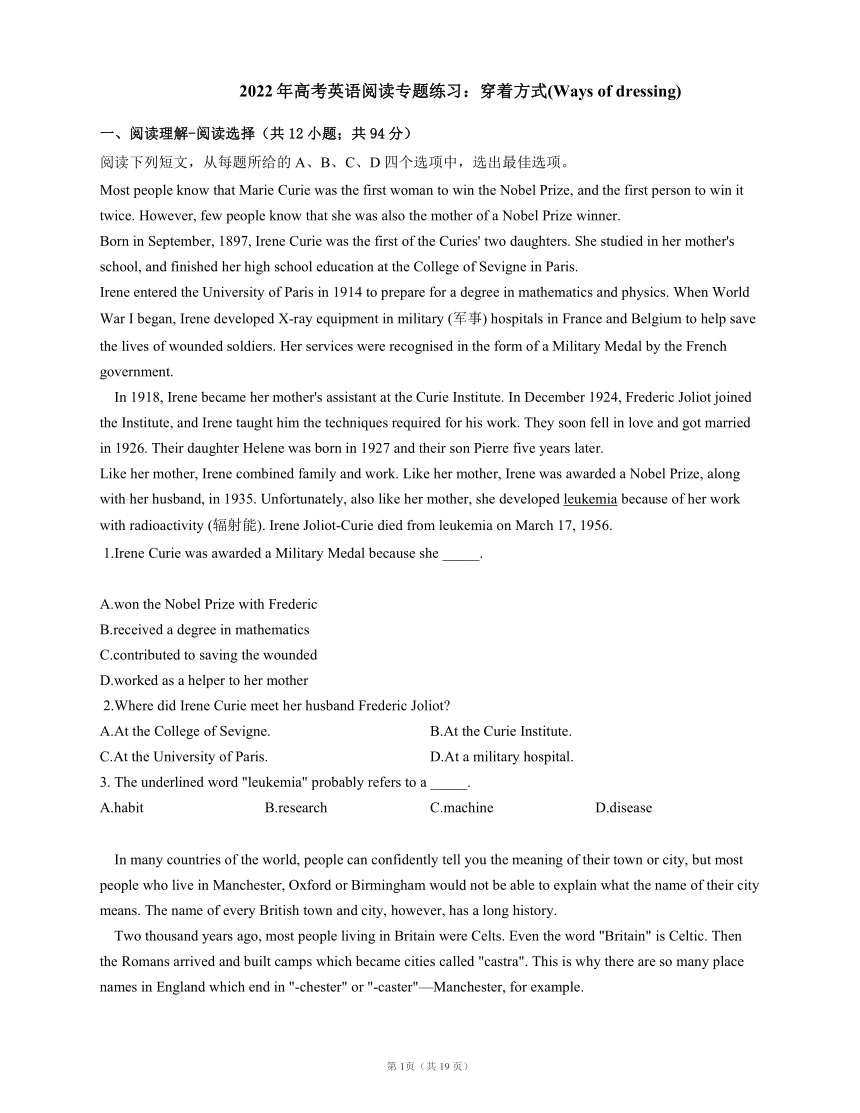
2022年高考英语阅读专题练习:穿着方式(Ways of dressing) 一、阅读理解-阅读选择(共12小题;共94分) 阅读下列短文,从每题所给的 A、B、C、D 四个选项中,选出最佳选项。 Most people know that Marie Curie was the first woman to win the Nobel Prize, and the first person to win it twice. However, few people know that she was also the mother of a Nobel Prize winner. Born in September, 1897, Irene Curie was the first of the Curies' two daughters. She studied in her mother's school, and finished her high school education at the College of Sevigne in Paris. Irene entered the University of Paris in 1914 to prepare for a degree in mathematics and physics. When World War I began, Irene developed X-ray equipment in military (军事) hospitals in France and Belgium to help save the lives of wounded soldiers. Her services were recognised in the form of a Military Medal by the French government. In 1918, Irene became her mother's assistant at the Curie Institute. In December 1924, Frederic Joliot joined the Institute, and Irene taught him the techniques required for his work. They soon fell in love and got married in 1926. Their daughter Helene was born in 1927 and their son Pierre five years later. Like her mother, Irene combined family and work. Like her mother, Irene was awarded a Nobel Prize, along with her husband, in 1935. Unfortunately, also like her mother, she developed leukemia because of her work with radioactivity (辐射能). Irene Joliot-Curie died from leukemia on March 17, 1956. 1.Irene Curie was awarded a Military Medal because she _____. A.won the Nobel Prize with Frederic B.received a degree in mathematics C.contributed to saving the wounded D.worked as a helper to her mother 2.Where did Irene Curie meet her husband Frederic Joliot A.At the College of Sevigne. B.At the Curie Institute. C.At the University of Paris. D.At a military hospital. 3. The underlined word "leukemia" probably refers to a _____. A.habit B.research C.machine D.disease In many countries of the world, people can confidently tell you the meaning of their town or city, but most people who live in Manchester, Oxford or Birmingham would not be able to explain what the name of their city means. The name of every British town and city, however, has a long history. Two thousand years ago, most people living in Britain were Celts. Even the word "Britain" is Celtic. Then the Romans arrived and built camps which became cities called "castra". This is why there are so many place names in England which end in "-chester" or "-caster"—Manchester, for example. The Romans never reached Wales or Scotland, and many place names there are Celtic. For example, Welsh place names that begin with "Llan" come from the Celtic word or church. After the Romans left Britain, it was attacked by tribes called the Anglo-Saxons who were from the area of Europe that is now Germany and Holland. Without the Roman army, it was impossible to protect the country from these people. The names of their villages often ended i ... ...
~~ 您好,已阅读到文档的结尾了 ~~

